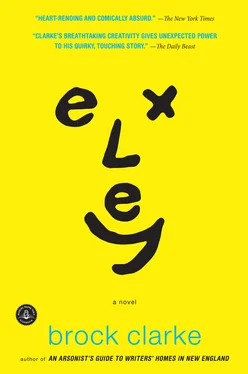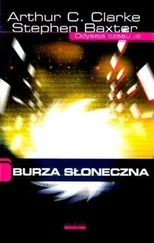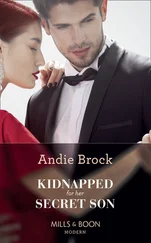“The night we first met,” Mother said to my dad. My dad sipped his Genny Light, then smiled at her, and then at me, and then at her again. “I’d just gotten out of law school. And your dad had just moved here from Utica.”
“Why did you move here anyway?” I asked my dad. I knew he was born in Utica and moved here from there, but this was the first time I’d ever thought to ask him why.
My dad shrugged. “I’d read good things about it in a book, I guess.”
Mother laughed at that. I hadn’t read, or even heard of, Exley’s book at this point, and so I didn’t know what book my dad was talking about or why Mother was laughing. But her laughter wasn’t bitter like it could be. It sounded fond, and far away. “It was the Crystal’s annual Christmas party,” Mother said. “I didn’t know anyone. Earlier in the night, before this picture was taken, I saw your dad turning around and around, like he was looking for someone. I thought maybe it was me he was looking for.”
“And you thought right, for Christ’s sake!” my dad said.
Mother smiled when my dad said that — not at my dad, but at the picture of my dad. Then she got up to get some more Early Times. My dad took his hand off the page, but I didn’t feel like flipping through the album anymore. “Were you really looking for Mom?” I asked.
“No,” my dad admitted. I didn’t like the way this sounded, and my dad must have realized that, because he said, “But I wasn’t going to find who I was looking for anyway. That’s why I was lucky I found your mom that night.”
“The rest of the world calls that settling for second best,” Mother said as she walked back in with her full glass.
“Well,” my dad said, “I call it love.”
The Return of Exley
It was six thirty when someone knocked on the door. On the front door, not the door that went right into the kitchen. I opened it. There was a guy standing on my front steps. He was wearing a blue corduroy shirt with a heavier, lined flannel shirt over it, and faded jeans with clunky low-cut work boots. It wasn’t snowing but it was windy; I could see the wet leaves blowing all over the neighborhood, and the guy’s gray hair was blowing all over the place, too. He had a lit cigarette in his mouth, and his beard was gray except for right around the mouth, where it looked yellow from the cigarette. We looked at each other through the whirling smoke from his cigarette. I thought I knew who he was, but I was afraid I was wrong, so I didn’t say anything. Besides, I think we both knew that he would have to be the one who spoke first.
“Jesus H. Keeriiisst, I hear you’re lookin’ for me, you goofy fuck,” Exley finally said. I nodded. “‘You’re some sack of potatoes, you are.’” He said all this with a good old Watertown accent, even the second sentence, which, according to A Fan’s Notes , was supposed to be in an Irish accent, with an emphasis on the “you.” But still, he said it! I could have hugged him. I might have actually done it, too, if he hadn’t walked right past me and lain right on the couch, which had been a couch until the moment he lay down on it, when it became a davenport. It’s funny how something changes so much when it’s used by the person who named it. Anyway, Exley put his feet up on the arm of the davenport — which is something Mother never let me do when I was lying on it and when we called it a couch — and then we stared at each other some more. It was like when I first saw my dad in the hospital: I’d been looking and looking for Exley, and now that I’d found him, or he’d found me, I didn’t exactly know what to do with him. Don’t think of him as Exley , I said to myself. Think of him as a guest . I went to the liquor cabinet, took out a bottle of vodka, poured some in one of the glasses out of which Mother drank her Early Times, and then brought it to Exley. He sat up, took the cigarette out of his mouth, and looked inside the glass, dubiously, then drank the whole thing at once. When he was finished, he held the glass to his mouth, and for a second I thought he was going to throw up into it, but he didn’t: he moaned, gave a full-bodied shiver, then slammed the glass on the coffee table like a guy in a Western might do. I almost laughed at that, but I wasn’t sure it was supposed to be funny, so I didn’t. Instead, I filled the glass half-full again, then looked at Exley, who said, “Oh, c’mon, friend,” and so I filled it to the top and got another “C’mon, friend,” except this one was even more full of disbelief and exasperation, and so I just handed Exley the whole bottle. He laughed at that, put his cigarette out with a hiss in the glass of vodka, and then lay back on the couch, resting the bottle on his chest. It looked like a weirdly shaped spear that had come up through the couch, into his back, and out his chest. Or maybe it looked like a divining rod that was plastic and meant to point at the ceiling and not at the ground. Or maybe it just looked like a plain old bottle of Popov. I was nervous , the way you get when you meet someone for the first time and you’re not exactly sure who’s giving the orders and who’s taking them.
“For Christ’s sake, what’s this all about, friend?” Exley finally asked.
I told him. I told him about my dad and how he was Exley’s biggest fan and how he was in the VA hospital and how I thought he’d get better if I took Exley to see him. Exley nodded like all that made sense. When I was done talking, Exley sat up, drank some vodka straight out of the bottle, put the bottle on the end table, put his feet on the floor, put his hands on his knees, and pushed himself up. Or most of the way up. He rocked back on his heels, toward the davenport, and I caught his hand and pulled him toward me with both of my hands. But I pulled too hard and Exley pitched forward too fast and I couldn’t stop him: I could barely get out of his way in time for him to miss me and hit the floor headfirst. His head made a big, loud crack when it hit the wood, and then Exley said, “Ooooh.”
“Are you all right?”
“Oh, I’m terrific,” Exley moaned as he rolled over on his back. There was a red mark on his forehead so big you could have just gone ahead and called the whole forehead a red mark. “Terrific and, indeed. ” And then he caught my eye, stopped talking for some reason, and said, “Why doncha help me up and then we’ll go see your old man.”
“I don’t think that’s such a good idea,” I said.
“Cha talking about?” Exley said. “Why not? Isn’t that what all this is about, friend?”
He called me “friend.” That was why not. So far Exley had called me “friend.” He said “for Christ’s sake” and “Jesus H. Keeriiisst.” He could say “cha” when most people would just say “you.” He’d called me “goofy.” All that was good. All that was the way he talked in the book. It was a good start. But there were plenty of other things he said in the book that he hadn’t said yet. Things that were beautiful. Things that were complicated, that made your head hurt. I guessed that those were the things my dad would really love to hear him say. Until he could talk like he used to all the time, and not just part of it, I didn’t want him to meet my dad. I had this idea that if Exley met my dad now, my dad wouldn’t wake up. I had this idea that my dad would lie there and think, Is that it ? I can say “Christ’s sake,” for Christ’s sake. Can’t he say anything else ? But I couldn’t tell Exley that. So I said, “It’s after visiting hours.”
“Oh,” Exley said. “Whacha say we get somethin’ to eat, then?”
“I already ate,” I told him.
“Oh,” Exley said again. He got up. I thought he was going to leave, but he wobbled over to the couch, plopped down on it, lit another cigarette, took another drink from the bottle of vodka, and then rubbed his forehead, but almost lovingly, like he’d really enjoyed smashing it against the floor. He pointed at the TV with his cigarette. “That thing work?” he asked.
Читать дальше












